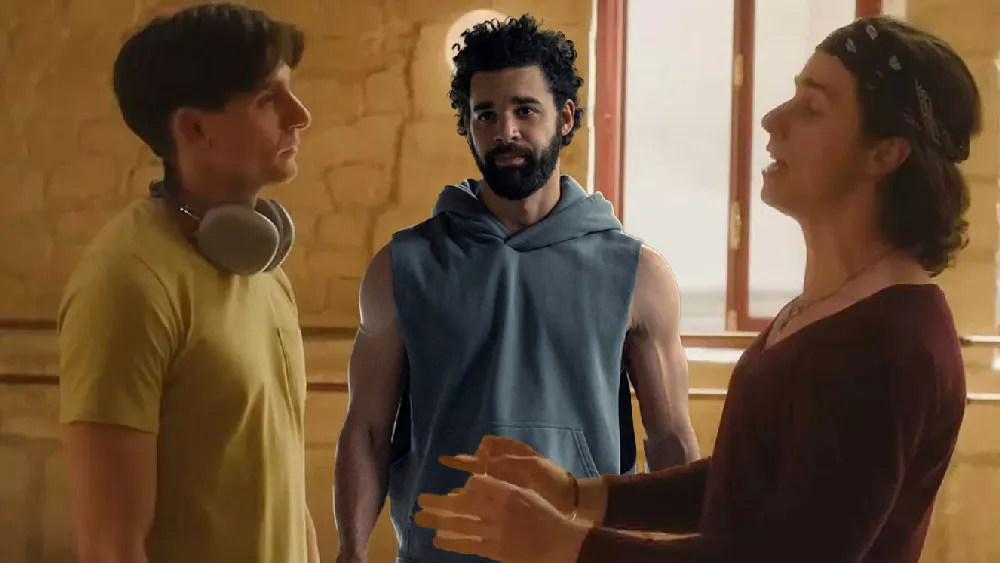March 26, 2018
Control Voices from Beyond :: Craig Beam on 'The Outer Limits' Season One on Blu-ray
Kilian Melloy READ TIME: 8 MIN.
When the original series of "The Twilight Zone" was given a meticulous restoration and hi-def transfer onto Blu-ray, fans of classic 1960s anthology shows immediately started salivating for a similar treat for that era's other still-famous program, the monster-centric Leslie Stevens-created, Joseph Stefano-produced "The Outer Limits."
In case you don't know what "The Outer Limits" was -- or have only a hazy memory of it -- each hourlong episode was preceded by either a teaser or by a clip from the story to come. The "Control Voice" (narrated by Vic Perrin) would encourage viewers to surrender to the program. "We control the vertical. We control the horizontal" became a catchphrase.
Though "The Outer Limits" only lasted a season and a half, its impact has resonated well beyond its original run of 49 episodes, with the show in constant syndication and a five-season reboot hitting the airwaves in the 1990s. As mentioned a moment ago, the series was also released -- in season sets as well as in a comprehensive complete series edition -- on DVD, though those releases lacked any extras. But this is the age of Blu-ray and 4K Ultra, a time when film buffs and fans of all television genres crave crisp, high-resolution images and lovingly restored editions of theatrical and television faves.
Moreover, when you watch these vintage episodes, they remain shockingly relevant, especially shows like "O.B.I.T.," which predicted both our loss of privacy through ubiquitous electronic surveillance and the way a hostile alien power has seized on that technology in a bid to destroy our social fabric, break down our national unity, and soften us up for conquest. Yes, we have passed through "The Twilight Zone" in real life and arrived at those very "Outer Limits" of yore.
Why oh why, then, has "The Outer Limits," like "Twilight Zone," "Star Trek," and "The X Files," never been given the kind of upgrade that its fans have clamored for?
Well, thanks to Kino Lorber, now it has - and how! Season One drops March 27 on Blu-ray, and the episodes not only look great, many of them also feature audio commentary tracks from the likes of David J. Schow ("author of two seminal "Outer Limits" books, "The Outer Limits Companion" and "The Outer Limits at 50"), musicologist Reba Wissner (author of "We Will Control All That You Hear: The Outer Limits and the Aural Imagination") and "Outer Limits" blogger (and "Twilight Zone" podcaster) Craig Beam.
If you've heard Craig Beam's "Twilight Zone" podcast, "Between Light and Shadow," you'll be familiar with Dr. Wissner; the podcaster and the musicologist share a passion for television music and an appreciation for the way scores propel and enhance cinematic storytelling. If you've followed another "Twilight Zone" podcaster, Tom Elliot, then you might know about Victor Gamboa's "Outer Limits" podcast, which started late last year and brought the news of the new Blu-ray edition to thrilled genre fans.
EDGE's review will follow, but for now just know this: It's been worth the wait. EDGE can also share a chat that Craig Beam was generous enough agree to, in which Beam discusses the show, details his contribution (as a "film historian"), and reminds us once again of just how prescient "The Outer Limits" could be.
EDGE: You were the host of a blog called "My Life in the Glow of the Outer Limits."Did this put you on the radar for Kino Lorber when it came time for them to find contributors for the Blu-ray set's extras?
Craig Beam: The blog was a celebration of each episode of "The Outer Limits" on the fiftieth anniversary of its original broadcast. It attracted the attention of David J. Schow, who was a tremendous help (and a tactful critic where necessary) throughout, and we became great friends. It was he who coordinated the talent for the commentaries; I was never approached directly by Kino Lorber.
I do think the blog definitely got me the gig; however, the fact that I'm also a podcaster with my own gear probably helped some. I believe Schow was already considering bringing Reba on board (since she's the only person other than him to actually write a book on the series), but I definitely made a point of recommending her. I also met her through my blog, and she and I are great friends now too (seriously, if you want to find new like-minded besties, start a blog and watch 'em crawl out of the woodwork).
EDGE: How did you end up drawing the episode assignments that you did? Did you submit a list of favorites for which you thought you'd be especially well suited to provide commentary?
Craig Beam: Schow asked me to record the commentary for "Specimen: Unknown" based on my write-up of it in the blog, with the possibility of doing one or two more. I asked to cover two of my favorites ("O.B.I.T." and "Corpus Earthling"), not really expecting to land them, but apparently, relentless begging actually works. I wanted "O.B.I.T." because it's so excruciatingly timely, all these decades later (it's probably the single most forward-thinking - and accurate - prediction of the future ever seen on the series). I wanted "Corpus Earthling" because... well, two words: Robert Culp.
EDGE: How did you go about preparing these commentaries? Did you script your comments in advance or did you sit down with a six-pack and just turn on the tap of your Outer Limits knowledge? And what was the technical process like in terms of timing your comments to match the action on the screen?
Craig Beam: Kino Lorber provided us with private links to 720p videos with burned-in time codes. I started by creating a skeletal outline of specific things I wanted to address in sync with the action on the screen, then wrote larger sections (cast and crew bios, extended ruminations, etc.) that would fall between them. I spent a lot of time struggling with the timing of everything... I'd have to add a few words here, subtract a few there, to fit the framework I'd created.
Keep in mind that I'd never done commentary tracks before - podcasting is very different. I mean, I pretty meticulously script the podcast, but I don't have to sync it up with anything, so in that respect, it's much easier. I probably made it way harder than it needed to be... plus the deadline was super tight, so this was a true trial by fire. I think I learned some valuable lessons about the process... time will tell if I ever have the opportunity to actually fall back on them again!
EDGE: Were there any limitations imposed on what you could say? (I notice that you weren't shy about pointing out shortcomings in the show's scripts and production, and neither was David J. Schow.)
Craig Beam: There were no set limitations on what we could say. I've been known to drop the occasional curse word in my podcast (and by "occasional" I mean "frequent"), but I did keep that tendency mostly in check just in case it would present a problem (unless I was directly quoting someone).
As far as the shortcomings of the respective episodes - there's an inherent danger in reviewing something that you love. It pained me a bit when I reviewed favorites like "The Architects of Fear" and "Demon With a Glass Hand" in my blog, because as brilliant as they are, there are glaring logic flaws in both of them. So you've gotta force yourself to be impartial and point out the good and the bad, which some folks hate.
You can prowl through the "Twilight Zone" and "Outer Limits" groups on Facebook and witness an endless parade of fans espousing undying love for every single episode. I've been criticized over the years for pointing out those aforementioned shortcomings in both my blogs and my podcast, and I've been accused of being a lesser fan somehow, as if a television series - not a person, not a pet, not your deity of choice - is somehow deserving of unconditional love and immunity from criticism. Ludicrous. You can't be a Yes Man and give an honest critique at the same time.
So "Specimen: Unknown," which is most definitely a lesser "Outer Limits" episode, was pretty much eviscerated in my blog, and much of that carried over into my audio commentary. And it'll probably piss somebody off because somewhere out there is a person who counts it as their all-time favorite. We get all kinds in here.
EDGE: It's so nice that finally, someone is talking about these shows in terms of the music! Paying attention to the score and composers is something you also do for "The Twilight Zone" on your current project, the "Between Light and Shadow" podcast, where musicologist and TV music expert Dr. Reba Wissner is a frequent guest. Dr. Wissner is also a commentator for this set - did you suggest her to Kino Lorber? Did / will the two of you put your heads together for some cross-pollination of observations and opinion on each others' commentaries?
Craig Beam: Yes, Reba and I read over one another's scripts before recording, if for no other reason than to provide encouragement to keep going. The two weeks leading up to the deadline were a total blur, but she definitely helped me stay focused. I hope I did the same for her. As for future collaborations.... mum's the word for now.
EDGE: The liner notes credits on "The Outer Limits" Season One Blu-ray set calls you a "film historian," as opposed to "blogger," "podcaster," "rabid fan," etc. - how do you feel this suits you?
Craig Beam: In all fairness, Kino Lorber called every commentator a "film historian," so it's a bit of a wash as to descriptive accuracy. I'm a huge film fan, but I've never written much about it... my purview has always been classic TV, with a strong emphasis on the more cinematic shows - "The Fugitive," "The Twilight Zone," "The Outer Limits." I did a ton of research throughout both my "Twilight Zone" and "Outer Limits" blogs, though... so okay, I'll take film historian. Another reviewer (the estimable Glenn Erickson) called me a "super fan blogger who knows his territory as well as any," which delights me to no end. I may have that inscribed on my tombstone.
Kilian Melloy serves as EDGE Media Network's Associate Arts Editor and Staff Contributor. His professional memberships include the National Lesbian & Gay Journalists Association, the Boston Online Film Critics Association, The Gay and Lesbian Entertainment Critics Association, and the Boston Theater Critics Association's Elliot Norton Awards Committee.






